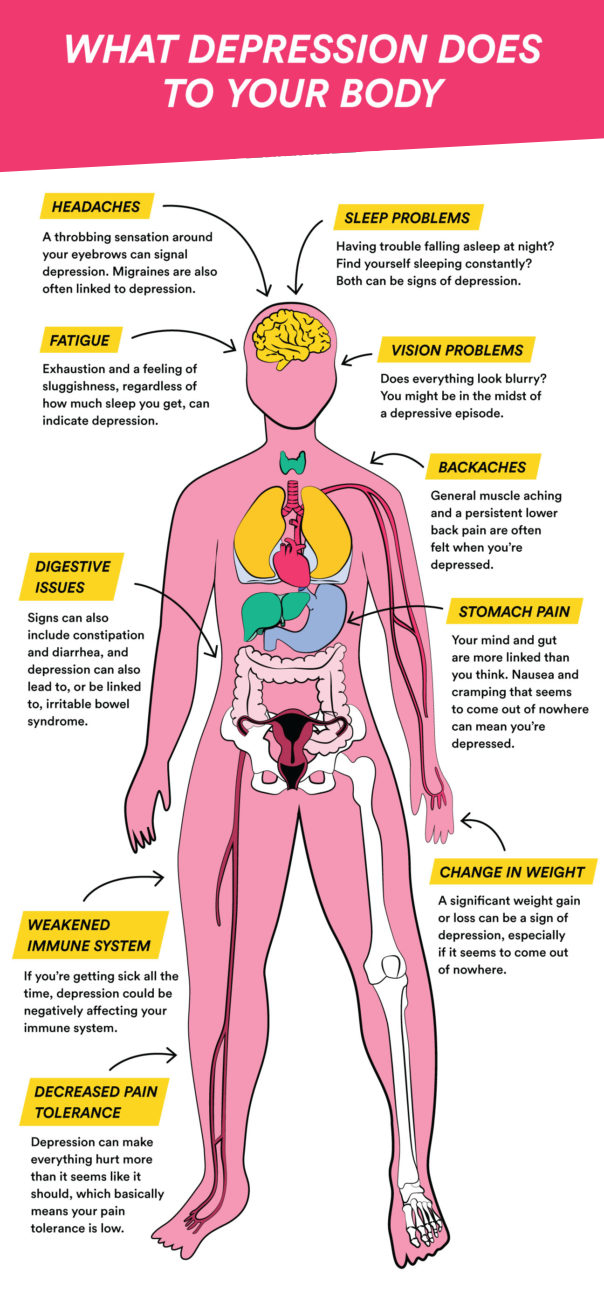Do you know the physical symptoms of depression?
Most of us know about the emotional symptoms of depression…
Yet depression can also inflict pain upon a person, creating physical symptoms of depression. In fact, many people with depression suffer from chronic pain or other physical symptoms.

And because they don’t know that their physical symptoms might be signs of depression, they don’t get help…
These physical symptoms aren’t “all in your head”…
Depression can cause real changes in your body…
For instance, it can slow down your digestion, which can result in stomach problems.
Physical Symptoms Of Depression
- Chest Pain.
There has been evidence that depression raises the risks of heart diseases and depression can also contribute to the discomfort associated with chest pain. Obviously, it’s very important to get chest pain checked out by an expert right away. It can be a sign of serious heart problems and not just a depression symptom.

- Back Pain and other Musculo-skeletal Pains.
If you already suffer with back pain, it may be worse if you become depressed. Other times, you may experience tenderness in your neck, muscles and joints. Depression can make any kind of chronic pain worse. If depression is not treated, it may lead to serious changes in your body’s structure, such as bone mass insufficiency leading to osteoporosis. - Headaches.
One of the most common physical symptoms of depression is headaches. These can be mild to severe. If you already had migraine headaches, they may seem worse if you’re depressed. - Digestive Problems.
Digestive problems such as a bloated stomach, difficulty to urinate, stomach acidity, diarrhea, indigestion, and chronic constipation can all be signs of depression. You might feel queasy or nauseous. - Change in Appetite or Weight.
This is the most common symptom of depression. Some people with depression lose their appetite and lose weight. Others find they crave certain foods — like carbohydrates — and gain weight. - Fatigue and Exhaustion.
Do even the smallest tasks seem strenuous to accomplish? This is a common physical symptom of depression. No matter how much you sleep, you still feel tired and getting out of the bed in the morning may be difficult, even impossible. - Dizziness or Nausea.
Due to different physical changes you may experience, you are likely to experience dizziness or light-headedness caused by lack of sleep or food as well as headaches. - Sleeping problems.
Depression does affect your sleeping patterns. You might wake up too early or can’t fall asleep when you go to bed. In fact, 80% of clinically depressed patients report complaints of insomnia. Or you may sleep much more than normal. - Loss of Sex Drive.
For some people, one of the physical symptoms of depression is a decreased sex drive. - Agitation and Physical Sluggishness.
This is a sign of severe depression. You might feel that you cannot sit still in one place and fidget constantly. Or you may move and talk slowly. These two conditions can be experienced alone or alternatively.
Over 300 million people in the world become depressed within a six-month period. In America alone, a reported 20 million people develop depression every year!
* Understanding the depression warning signs can help you assess your condition and make sure you get the correct treatment…
Treating Physical Depression Symptoms
These physical symptoms of depression may be experienced alone or in combination. But don’t despair or get scared.
What Can You Do?
Seek help…
- Self-help is often sufficient. There are professionally developed products available. You can get help to deal with depression and experience real relief from depression symptoms.
- Tell your health care provider about any physical symptoms. Don’t assume they’ll go away on their own. They may need additional treatment. Trained professional therapists can offer very effective help. They will listen to you and offer advice about how to overcome your depression.
- Get additional input. The book, Feeling Good by David Burns is a useful guide in changing the way you think about yourself and the world.
- Medication is also an option. Since pain and depression go together, sometimes easing your pain may help with your depression. Some antidepressants, such as Cymbalta and Effexor, may help with chronic pain, too.
- Other treatments can also help with painful symptoms. Certain types of focused therapy — like cognitive behavioural therapy — can teach you ways to cope better with the pain.
